

Www.epi.org/page/-/pdf/bp278.pdf. Beyond the Bullet Points: It is Time to Stop Trying to Save Libraries. Close the crisis center.
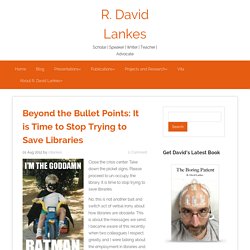
Take down the picket signs. Please proceed to un-occupy the library. It is time to stop trying to save libraries. No, this is not another bait and switch act of verbal irony about how libraries are obsolete. This is about the messages we send. Where did they get the idea that libraries are sinking? Position Statement on Instructional Classification. AASL supports the inclusion of certified school librarians as part of the National Center for Education Statistics (NCES) "Instruction" classification.
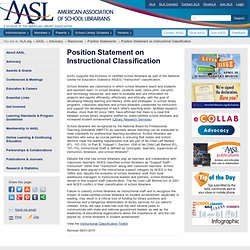
School libraries are classrooms in which school librarians teach and students and teachers learn. In school libraries, students read, utilize print, non-print, and technology resources, and learn to evaluate and use information for projects and reports efficiently, effectively, and ethically, with the goal of developing lifelong learning and literacy skills and strategies. In school library programs, classroom teachers and school librarians collaborate for instruction and support the development of each other's teaching skills. International Association of School Librarianship - School Libraries Worldwide. Www.iste.org/docs/pdfs/sigms-position-statement.pdf?sfvrsn=2. Www.ala.org/aasl/sites/ala.org.aasl/files/content/guidelinesandstandards/learning4life/resources/LMS-DANIELSON.pdf. Position Statement on the Role of the School Library Program. Learning for life…whether the focus is on readiness for the next grade or college and career readiness, the school library program plays a crucial role in preparing students for informed living in the 21st century.
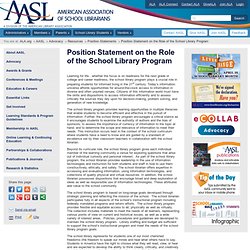
Today’s information universe affords opportunities for around-the-clock access to information in diverse and often unjuried venues. Citizens of this information world must have the skills and dispositions to access information efficiently and to assess critically the sources they rely upon for decision-making, problem solving, and generation of new knowledge. The school library program provides learning opportunities in multiple literacies that enable students to become efficient and effective in the pursuit of information.
School Libraries Count! AASL's National Longitudinal Survey of School Library Programs AASL sponsors a longitudinal survey to provide data on the health of the nation's school library programs.
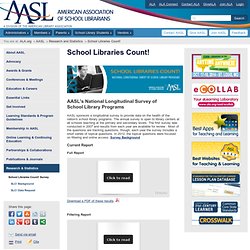
The annual survey is open to library centers at all schools teaching at the primary and secondary levels. The first survey was conducted in 2007 and results from each year are available for review . Most of the questions are tracking questions, though, each year the survey includes a short series of topical questions. In 2012, the topical questions were focused on filtering and online access. Current Report Full Report Individual Reports 2012 individualized reports are now available. Access individualized reports for 2012, 2011, 2010, and 2009. School libraries that participated in the 2012 School Libraries Count! To access 2012 report you will need your NCES number as your user name and the password you created. You can contact AASL. Academic Services and Teacher Certification. In an effort to facilitate the movement from one state to another, the UK College of Education will attempt to link to the teacher certification requirements for the 50 States.
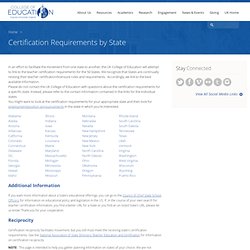
We recognize that States are continually revising their teacher certification/licensure rules and requirements. Accordingly, we link to the best available information. Please do not contact the UK College of Education with questions about the certification requirements for a specific state. Instead, please refer to the contact information contained in the links for the individual states. You might want to look at the certification requirements for your appropriate state and then look for employment/position announcements in the state in which you’re interested. Lms. ADEPT for Library Media Specialists Following statewide implementation of South Carolina's ADEPT system in 1998, it became apparent that the performance standards for classroom teachers did not appropriately reflect what school library media specialists were expected to know and to be able to do. As a result, a statewide work group, comprised of representatives from school districts, institutions of higher education, and the State Department of Education, was formed to develop appropriate performance expectations for library media specialists.
Following an extensive field review of these performance dimensions, a formal evaluation model was developed, disseminated for field review, and subsequently piloted during the 2001-02 school year. Dese.mo.gov/divteachqual/teached/competencies/FINAL_LibraryMedia_2007_without_codes.pdf. Archives.doe.k12.ga.us/DMGetDocument.aspx/media_specialist_eval.pdf?p=6CC6799F8C1371F615CBA1D29585BC8281490AF921E92EEAA795A35880EED2AA&Type=D. Alabama Professional Education Personnel Evaluation Program.
Specialty Area Educators This page contains the latest versions of the evaluation manuals and forms for specialty area educators (counselors, library media specialists, psychologists/ psychometrists, special education teachers of students with severe disabilities, and speech language pathologists).
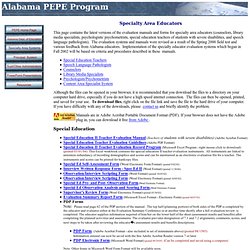
The evaluation systems and manuals were revised as a result of the Spring 2000 field test and various feedback from Alabama educators. Implementation of the specialty educator evaluation systems which began in Fall 2002 will be based on criteria and procedures described in these manuals. Although the files can be opened in your browser, it is recommended that you download the files to a directory on your computer hard drive, especially if you do not have a high speed internet connection. The files can then be opened, printed, and saved for your use. Manuals are in Adobe Acrobat Portable Document Format (PDF). Special Education PDP Form. |return to top of page| Speech Language Pathologist. Alaska School Library Handbook / Evaluation of School Library Media Specialists. Annual observations and evaluations are an opportunity to showcase your library program.
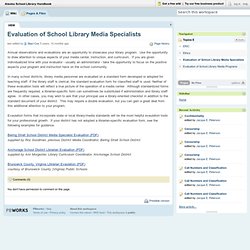
Use the opportunity to draw attention to unique aspects of your media center, instruction, and curriculum. If you are given individualized time with your evaluator - usually an administrator - take the opportunity to focus on the positive aspects your program and instruction have on the school community. In many school districts, library media personnel are evaluated on a standard form developed or adopted for teaching staff. If the library staff is clerical, the standard evaluation form for classified staff is used.
CPSLibraries - reach. Performance Evaluation of School Librarians. NY Districts Gain School Librarian Evaluation Tool. School librarians in New York State now have their own customized evaluation rubric, thanks to members of the New York Library Association (NYLA).
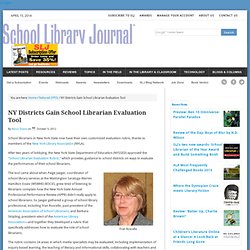
After two years of lobbying, the New York State Department of Education (NYSSED) approved the “School Librarian Evaluation Rubric,” which provides guidance to school districts on ways to evaluate the performances of their school librarians. Fran Roscello The tool came about when Paige Jaeger, coordinator of school library services at the Washington Saratoga Warren Hamilton Essex (WSWHE) BOCES, grew tired of listening to librarians complain how the New York State Annual Professional Performance Review (APPR) didn’t really apply to school librarians. The rubric contains 24 areas in which media specialists may be evaluated, including implementation of inquiry based learning, the teaching of literacy and informational skills, collaborating with teachers and administrators, and the pursuit of professional development.
The Framework for Teaching. Being Indispensable: A School Librarian’s Guide to Becoming an Invaluable Leader - Books / Professional Development - Books for School Librarians - New Products. This title is also available for purchase as an e-book or as a print/e-book bundle. 184 pages 7" x 10"SoftcoverISBN-13: 978-0-8389-1065-8 Year Published: 2011AP Categories: A, E, G Check out a sample of the book now!
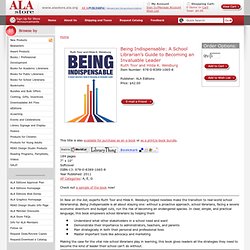
In New on the Job, experts Ruth Toor and Hilda K. Weisburg helped newbies make the transition to real-world school librarianship. Being Indispensable is all about staying one: without a proactive approach, school librarians, facing a severe economic downturn and budget cuts, run the risk of becoming an endangered species. Table of Contents Introduction Part I Knowing Who You Are1 What’s Your Mission? Part II Knowing Your Stakeholders4 What Do Administrators Want? Part III Thinking Bigger8 How Does Advocacy Develop Leadership? Appendix: Web Resources Index About the Authors. School Librarian Evaluation Workbook. A 21st-Century Approach to School Librarian Evaluation A 21st-Century Approach to School Librarian Evaluation uses the AASL Empowering Learners program guidelines as a basis for a school librarian evaluation rubric—one that can be adapted or duplicated by school librarians and shared with school administrators.
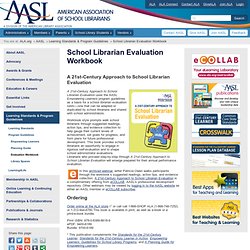
Workbook style prompts walk school librarians through suggested readings, action tips, and evidence collection to help gauge their current levels of achievement, set goals for progress, and form plans for future professional development. Empowering Learners: Guidelines for School Library Programs - Books for School Librarians - Books / Professional Development. This title is also available for purchase as an e-book or as a print/e-book bundle. 64 pages8" x 11"SoftcoverISBN-13: 978-0-8389-8519-9Year Published: 2009 As we approach the second decade of the twenty-first century, school library programs continue to undergo momentous changes that have heightened the importance of technology and evidence-based learning.
The focus has moved from the library as a confined place to one with fluid boundaries that is layered by diverse needs and influenced by an interactive global community. Guiding principles for school library programs must focus on building a flexible learning environment with the goal of producing successful learners skilled in multiple literacies. Www.danielsongroup.org/ckeditor/ckfinder/userfiles/files/Observing Classroom Practice - Educational Leadership article by Charlotte Danielson.pdf. Charlotte Danielson. Charlotte Danielson recognizes the complexity of teaching and the cognitive demands it makes. She developed the framework as a means to promote clear and meaningful conversations about effective teaching practice. Charlotte Danielson is an internationally-recognized expert in the area of teacher effectiveness, specializing in evaluations of teaching practice that both ensure teacher quality as well as promote professional learning.
She advises State Education Departments and National Ministries and Departments of Education, both in the United States and overseas. She has been a keynote speaker at national and international conferences, and has served as a policy consultant to legislatures and administrative bodies. New York approves a new school librarian evaluation rubric. Usny.nysed.gov/rttt/teachers-leaders/practicerubrics/Docs/nyla-rubric.pdf. Www.ala.org/aasl/sites/ala.org.aasl/files/content/guidelinesandstandards/learning4life/resources/sample_job_description_L4L.pdf.